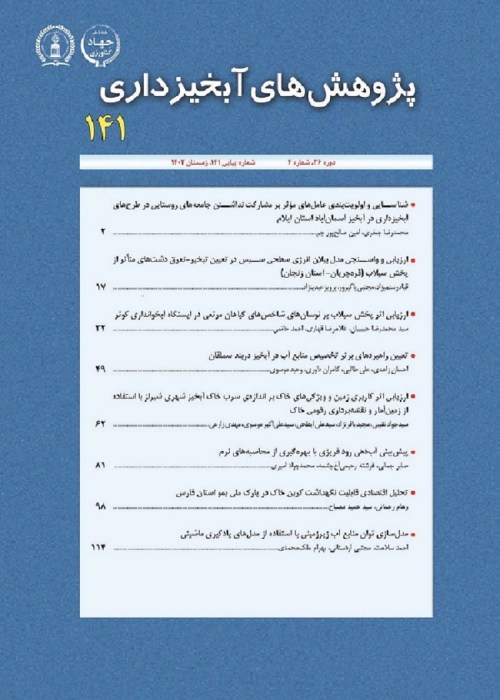The feasibility study on the use of decision support systems for participatory watershed management from the perspective of different groups of stakeholders (Case study: The Chel-chai Watershed, Golestan Province-Iran)
Author(s):
Abstract:
Natural resource management is among the important challenges encountered in most developing countries that requires explicit consideration of stakeholders interests as well as new techniques application. To do this, it is necessary to allow stakeholders to participate in decision making process and express their views across all stages of the process. Decision Support Systems (DSSs) as computer-based tools, assist stakeholders to reach their final informative decisions. To warrant the success of DSSs, it is crucial to bring together and assess the ideas, comments, and feedbacks of stakeholders during, and after the development process of a DSS. In this study, following the development of a DSS for the participatory integrated management of the Chel-chai Watershed in Golestan province, through conducting a filed survey and completing a questionnaire, the ideas and feedbacks received from the potential users of the Bayesian DSS were collected and assessed. The different groups of attendants in the survey were compared based on their responses using two statistical tests (the Mann-Whitney test and the Wilcoxon test) conducted in the R package.The results suggest the differences between groups of watershed managers and staff of the local and state offices for natural resource management to groups representatives of watershed communities in each of the questions is not significant at the 0.05 level. The results suggest that through a training course on principles, capacities, and functionalities of DSSs, for the group of managers and staff, the use of DSSs can assist this group of stakeholders in decision making process. As a result, application of DSSs can become a routine procedure for this group of stakeholders. In contrast, given the poor status of literacy and the computer skills of the watershed communities in the study area, the direct use of this type of computer-based systems is not expected and effective. Communication with some intellectuals among the watershed communities to provide some information and skills, can be an effective solution to the above shortcoming.
Keywords:
Language:
Persian
Published:
Whatershed Management Research, Volume:27 Issue: 105, 2015
Pages:
54 to 66
magiran.com/p1638535
دانلود و مطالعه متن این مقاله با یکی از روشهای زیر امکان پذیر است:
اشتراک شخصی
با عضویت و پرداخت آنلاین حق اشتراک یکساله به مبلغ 1,390,000ريال میتوانید 70 عنوان مطلب دانلود کنید!
اشتراک سازمانی
به کتابخانه دانشگاه یا محل کار خود پیشنهاد کنید تا اشتراک سازمانی این پایگاه را برای دسترسی نامحدود همه کاربران به متن مطالب تهیه نمایند!
توجه!
- حق عضویت دریافتی صرف حمایت از نشریات عضو و نگهداری، تکمیل و توسعه مگیران میشود.
- پرداخت حق اشتراک و دانلود مقالات اجازه بازنشر آن در سایر رسانههای چاپی و دیجیتال را به کاربر نمیدهد.
In order to view content subscription is required
Personal subscription
Subscribe magiran.com for 70 € euros via PayPal and download 70 articles during a year.
Organization subscription
Please contact us to subscribe your university or library for unlimited access!



